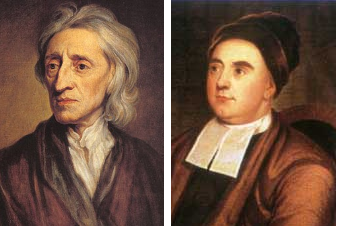
Locke and Berkeley
Recent News
- The first paper topic has been assigned, due November 16.
This is the home page of G. J. Mattey’s Philosophy 172, Locke and Berkeley, for Fall Quarter, 2015.
The Course
Philosophy 172 introduces the student to central works by two of the leading British empiricists of the early modern period, John Locke and George Berkeley.
General Catalog Course Description
Principal metaphysical works of John Locke and George Berkeley. Topics include abstract ideas, existence of matter, primary and secondary qualities, essence, substance, the existence of God, and the nature of scientific knowledge.
The Topic
The seventeenth and eighteenth centuries saw the birth of what has come to be known as the modern philosophy,
which broke in many ways from the philosophy of the ancients and medievals. Two of the central figures in the development of early
modern philosophy were John Locke (1632-1704) and George Berkeley (1685-1753).
Locke’s major metaphysical work was his An Essay concerning Human Understanding (first edition, 1690). The aim of the book was to inquire into the powers and limits of the human understanding, so as to discover the principles that ought to regulate our opinions and actions. The outcome of the inquiry would temper our tendency to employ the understanding in speculations that it cannot settle, leading to skepticism. Locke claimed that the human mind at birth is devoid of content, like white paper. Experience alone is resposible for the ideas
with which the mind is populated (hence the description of his method as empiricist
). Experience is the basis of our knowledge of ourselves, of external objects, and of God. This knowledge, however, is somewhat circumscribed by the limitations of the input which experience is capable of producing.
Berkeley’s philosophy is best known through his early writings, A Treatise concerning the Principles of Human Knowledge (1710) and Three Dialogues Between Hylas and Philonous (1713). In those works, he tried to show that Locke’s principles in fact lead to skepticism concerning external objects. To remedy this problem, he proposed that physical things such as apples and mountains are nothing more than collections of ideas that depend on the minds of individual perceivers and the mind of God (hence the description of his proposal as idealism
). His slogan was that the esse or being of physical things is percipi, to be. Berkeley argued further that this view accords with common sense.
The Favicon
The almond will soon be the highest-revenue crop in Yolo County, the site of the University of California, Davis. Locke used it as an example to illustrate his thesis that the ideas of secondary qualities
(such as color and taste) do not resemble the powers that produce them. Pound an almond, and the clear white colour will be altered into a dirty one, and the sweet taste into an oily one. What real alteration can the beating of the pestle make in any body, but an alteration of the texture of it?
(An Essay concerning Human Understanding, Book II, Chapter VIII, Section 20).
